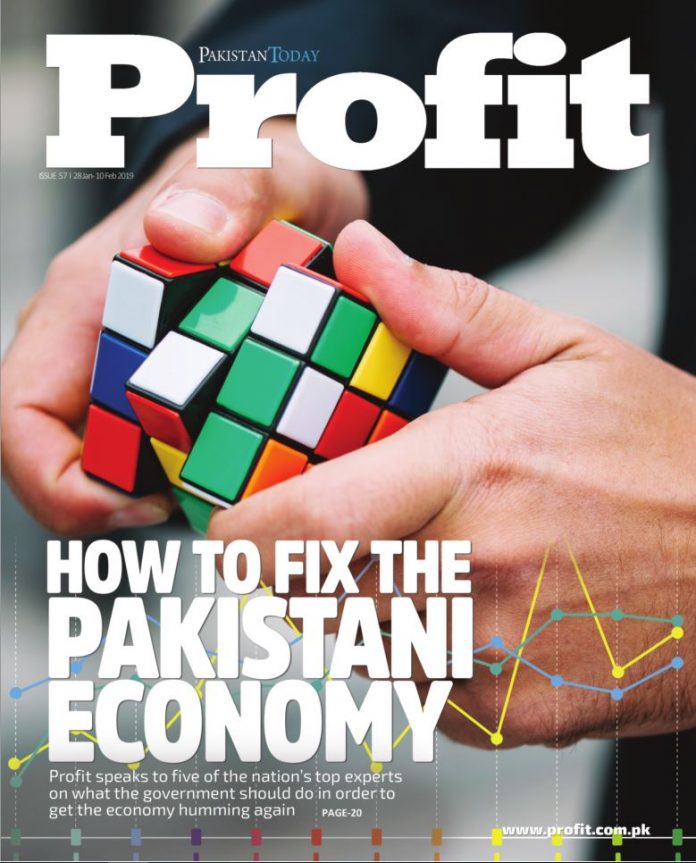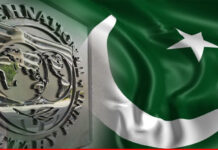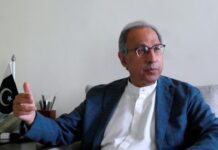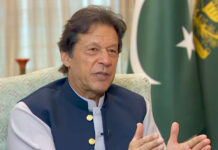
It is not an often-appreciated fact, but politicians actually do try to keep most of their major campaign promises, at times regardless of whether those promises are worth keeping. For instance, Nawaz Sharif was obsessed with improving electricity availability in urban areas of Pakistan because that is what he promised voters. Asif Ali Zardari named every possible thing he could after his late wife because he ran on the memory of Benazir Bhutto. And Imran Khan is obsessed with not turning to the International Monetary Fund (IMF), even if it means making his otherwise perfectly intelligent finance minister look like a bumbling idiot to everyone who remembers him from days as a titan of Corporate Pakistan.
In recent days, the government appears to be finding its rhythm finally, after months of what appeared on the surface to be inactivity, but what we now know was essentially the time it took them to complete an intense international begging tour to all countries that still give the government of Pakistan some attention and respect. It also looks like the government might actually be able to achieve its goal: get a combination of both short-term current account and fiscal support from so-called friendly foreign governments, avoid going to the IMF for a bailout which would likely come with many strings attached, while also building the breathing room to enact difficult, but necessary, structural reforms.
Except that this image is not at all true. Indeed, the Imran Khan Administration might well be mortgaging future of the next generation of Pakistanis to foreign governments whose agenda is far from clear, and whose economic and political interests in Pakistan are far from benign.
Let us consider the most charitable interpretation of what the government is seeking to achieve.
Firstly, the government wants to avoid an IMF bailout because that typically comes with conditions that the government considers too harsh, and not tailored to the Pakistani economy’s needs. Nonetheless, the government does recognise that the balance of payments crisis in has hit an acute phase, and the economy needs an immediate injection of dollars from somewhere. And so, it is following through with the second prong of its agenda: seeking balance of payments support, through a combination of deferred oil payments and government loans and deposits from the governments of Saudi Arabia and the United Arab Emirates, and the prospect of support from some other governments such as China and Qatar.
And then lastly, the government claims to be enacting structural reforms through what is being termed a “mini-budget” but is really more of an omnibus statement of economic priorities on the part of the Imran Khan Administration.
Here are some questions that we would like to ask the government about its strategy: why do we not know how to negotiate with the IMF? We have been through nearly two dozen rounds of negotiations for IMF bailouts before in our history. Why does the finance ministry still not have the kind of competent staff that could negotiate a bailout package that is flexible enough for the needs of the Pakistani economy?
On the question of the alternatives to the IMF, we also have concerns about the government’s strategy, as well as some questions. For instance, the balance of payments support it has been able to get from Riyadh and Abu Dhabi is for between one and two years. What happens when that period ends and the money needs to be paid back? Where will the money come to replace the outflow?
We would like to dig deeper on this question: what exactly are Saudi Arabia and the United Arab Emirates getting in return for their financial support of the government of Pakistan? Will Pakistani troops be sent to fight the Saudi crown prince’s vicious war in Yemen? Will the independence of Pakistan’s relationship with Iran or any other country be affected? What exactly is the price Pakistan is paying for this money and will be paid in Pakistani blood?
And then there is the question of the so-called structural reforms laid out in the mini-budget. If there were any, please let us know, because we found precisely zero policies announced by Finance Minister Asad Umar that would address any of the long term structural challenges facing the Pakistani economy.
It was more of the same: a few crowd-pleasers mainly designed to appeal to Pakistan’s upper middle class and business owners. Nothing that forces the tax-evading wealthy to pay their fair share. Nothing that addresses the growing – and by now perennial – the problem of inter-corporate circular debt in the energy supply chain. Nothing to level the playing field for smaller businesses seeking to develop globally competitive, export-oriented companies in Pakistan that happen to not be in the dominant but sclerotic textile sector.
Is this what passes for structural reform under the Imran Khan Administration? Is this the very best that the brilliant Asad Umar can do? Is it?
We are not angry or frustrated with Asad Umar. Just disappointed. He should know better. And he probably does. But he lacks the courage of his convictions to speak truth to power. He should remember that history tends to be very unkind to those who make their talents subservient to their hunger for proximity to power.
There is a big difference between the Saudi government seeking to build a multi-billion-dollar refinery in Pakistan because Riyadh seeks to wield political influence over Islamabad and a multinational company that decides to set up a subsidiary in Pakistan because it genuinely believes in the prospects of the Pakistani market.
The reason why the IMF is a better option that money from Saudi Arabia or the UAE is that, unlike the Saudi and Emirati money, the IMF money comes with a “good-housekeeping seal of approval”. Global investors look at a successful implementation of an IMF bailout programme as a sign that an economy is finally turning the corner and undertaking the structural reforms it needs to take.
And what, pray tell, is so wrong with the IMF’s conditions. While there are lots of specifics, the IMF’s fundamental purpose comes down to getting the government to stop wasting money on subsidising the inefficient energy consumption of the upper middle class, and tax the people who actually should be taxed in the country. What is so wrong with that?
And as to the charge that the IMF does not customise its policy prescriptions for Pakistan, that is only because Pakistan’s problems are completely identical to those of other badly run economies. We lack originality even in the nature of our economic crises!
Asad Umar is seeking to undertake a highly complicated manoeuvre to bypass the IMF. It is possible he may achieve some short-term success. But the long-term cost of that will be paid by every Pakistani under the age of 40. It is a big disappointment to see this inanity come from a man who used to inspire and empower young people to do great things.


































This article is pointless. You’re going on as if Pak can’t get IMF loan. Reality is America didn’t want to give Pak IMF loan and thats why Pak didnt get it. Simple as that. US pressure tactics. There was nothing Pak could do to get the IMF loan. If big sam says no, its a no. However this might change soon as long as Pak is doing what US wants in helping taliban talks. This article is pointless and doesnt take into account realities that are out of Paks control. In fact, Pak has done well given the US pressure during 2017-18
Well, its presented as if IMF is the crises management entity laying emphasis that the funds policies will forcefully ensure the devision of economic growth policies without considering the fact that it had failed to do so in past as also pointed out by writer that we have taken loans from imf in past…so not choose a different option…strings are always attached to every borrowing, nonetheless..
I’m not frustrated and angry at your rant cum article, just disappointed. You’re much better than this. While questioning how would Pakistan pay for loans from friendly countries why didn’t you tell us how IMF bailout will be paid back which you are so eager to push for. Asad Umar is not perfect but at least he has given hope to a country which was at the edge of bankruptcy that IMF is not the only saviour in the world to solve a BOP crisis which was not even created by this government. You don’t like the prescription, fine. At least accept that their treatment has worked. Look forward to a more balanced and objective critique in future.
There is a big difference between the Saudi government seeking to build a multi-billion-dollar refinery in Pakistan because Riyadh seeks to wield political influence over Islamabad and a multinational company that decides to set up a subsidiary in Pakistan because it genuinely believes in the prospects of the Pakistani market.
I would take this as the gist of what the writer is trying to advocate. We need the latter more than what Saudi UAE and even China are doing for us .
Look at the history of world Bank and IMF ,they are solely working for a specific agenda, and prompting it’s political,economic and social objectives,even providing loans to the most corrupt regimes. these are called odious debts and many countries after changing their govt.refused to pay back.
Pakistan “trap of odious debt”
Pakistan has become a paradise for aristocracy,fuedal loards,corrupt generals,industrialists, oligarchy and unbridle bureacracy.It is not democracy but” debtocracy”.
I appeal to intelligentia,academicians,civil society, and citizens to raise their voice about the corrupt practices of our politicians who have made their lives a virtual hell by burdening and burying them and their generation under compound interest by extending begging bowels to world bank and IMF,so that in future these parasites and callous rulers would not be able to get finance from these institutions to strengthen their grip on the poor people of pakistan.
Here are some good examples of some leaders who raised voices against the World Bank and IMF who finance the corrupt politicians against the will of the people by declaring these debts as” odious” and “moral hazard” where the actions of one party,institution or individual may not take full responsibilities and consequences of the detriments and harmful effects to the victim party.
Rafel Correa of Ecuador launched his election campaign against the corrupt politicians and collaborator WORLD BANK AND IMF,promised to get rid his country from the clutches and control of these mafia.When he came to power,he expelled the World Bank envoy and threaten to default officially on Billions of Dollars of foreign debt it considered”illegitimate”He ordered not to approve a debt interest payment describing the international lenders as “monsters”
Another example is of Haiti where after the overthrow of Jean-claude Duvalier,the civil society called the concellation of Haiti debts of multilaterial institutions by calling it” unjuest odious debts” as it was borrowed by corrupt rulers.They succeeded in reducing the price for education,healthcare and basic infrastructure.
Another example is of Mexico,it repudiated of its debts incurred by Emperor Maximilian,s regime as it was contrary to the interests and needs of the nation it was not binding on the people.
These debts are hostile and misused by the corrupt politicians and elite mafia that pamper on the ignorance of the common people.
In Europe,the debt countries demonstrators scream”make the bankers pay” declaring the loans illegal and odious. In Greek some parties have emerged as leading champions of debt denial and called it “orgy of corruption”
In polls across europe,a growing majority reject the international monetary fund,s prescriptions.
Comments are closed.